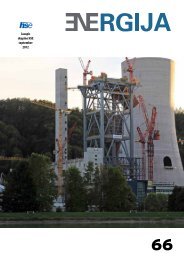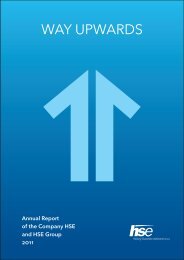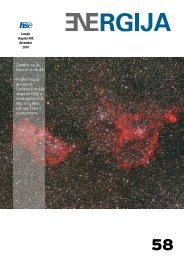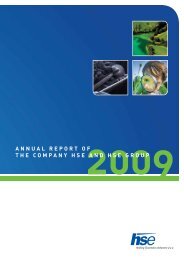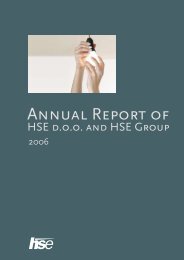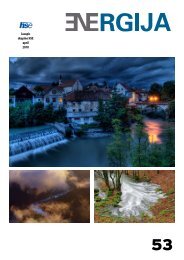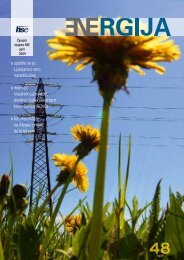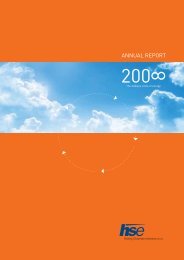Annual report - HSE
Annual report - HSE
Annual report - HSE
Create successful ePaper yourself
Turn your PDF publications into a flip-book with our unique Google optimized e-Paper software.
The scope of trading on the Italian market increased, in comparison with financial year<br />
2011, which is mainly a result of purchasing cross-border transmission capacities, enabling<br />
transfer of electricity from Slovenia, Austria, Switzerland and France to Italy. In 2012,<br />
Italy also increased its RES-based installed capacity, especially from solar energy. It was<br />
expected to influence the electricity price; however, the Standard National Price in summer<br />
was relatively high, and reached an average of 85 EUR/MWh, in August.<br />
The Swiss electricity market remains relatively illiquid, which is shown in large trading gap<br />
for almost all products listed in trade portals. Prices are under strong seasonal influence,<br />
since Switzerland imports electricity during winter and intensively sales it in spring and<br />
summertime.<br />
SE Europe<br />
In 2012, the recession in the area of the SE Europe additionally deteriorated, which had<br />
a significant impact on trading with electricity. Although the average daily supply price<br />
decreased in 2012, the winter and early summer day-ahead market prices reached<br />
record values. This was a result of long periods of draught, causing decreased electricity<br />
production, and of incredibly low temperatures, which reflected in higher consumption.<br />
Extraordinary circumstances influenced also a temporary border restrictions and ban of<br />
electricity exports from the countries with record consumption. In the second half of the<br />
year, especially in the last quarter of 2012, prices changed drastically, due to abundant<br />
precipitations and deteriorated economic conditions. As industrial consumption continued<br />
to decline, certain countries further reduced their electricity purchases in the market. In<br />
this way, Montenegro exported electricity for the first time. On the SE Europe markets,<br />
trading liquidity decreased, since credit ratings of trading companies continued to drop.<br />
Due to insufficient financial liquidity of companies in the region, operating risks increased<br />
additionally, which led to stricter monitoring of credit ratings of all business partners,<br />
increased trading in organised electricity markets and lower number of bilateral deals.<br />
In 2012, <strong>HSE</strong> participated – directly or through its subsidiaries – in most auctions for crossborder<br />
capacities in SE Europe. Due to liquidity and operating electricity exchange, Hungary<br />
is the <strong>HSE</strong>’s most relevant market in SE Europe in terms of transactions in connection with<br />
hedging against price changes and portfolio balancing at hourly basis. In 2012, <strong>HSE</strong> traded<br />
in Hungary on the behalf of the controlling company.<br />
In 2012, Romania adopted an act for mandatory trading on OPCOM. For <strong>HSE</strong>, this has<br />
been an insurmountable obstacle; namely, due to VAT repayment issues for foreign<br />
organisations we cannot trade directly on the electricity exchange and have been forced<br />
to trade through intermediaries instead. For this reason, at the end of 2012 we decided to<br />
establish a branch in Romania, through which will could trade at OPCOM exchange.<br />
Due to financial problems of Greece, <strong>HSE</strong> limited trading on the Greek market and<br />
consequently its exposure to the market already in 2011. <strong>HSE</strong> carefully monitored financial<br />
situation of its business partners also on other markets. Nevertheless, most of activities<br />
were carried out uninterruptedly. In mid-2012, Bulgaria additionally increased electricity<br />
export duties, thus raising the price of Bulgarian energy to the extent to render export<br />
economically unreasonable. This reduced the trading scope of <strong>HSE</strong> MAK Energy, mainly<br />
engaged in transferring Bulgarian energy to other SE Europe markets At the end of 2012,<br />
we were successful in launching energy supply to Albanian borders. In the last quarter, the<br />
company <strong>HSE</strong> BH purchased hydro-electricity surpluses in Bosnia and Herzegovina for<br />
transmissions to other electricity markets. Even in 2012, <strong>HSE</strong> Adria presented a significant<br />
link within the <strong>HSE</strong> Group, since it connects the domestic market with the markets of SE<br />
Europe.<br />
<strong>Annual</strong> Report <strong>HSE</strong> 2012<br />
2 Business Report<br />
58




